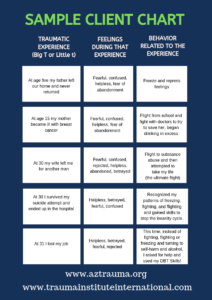Dejaye Botkin is joining our team at Arizona Trauma Institute and Trauma Institute International teaching a course called DBT Skills for Trauma and Attachment Starved Clients.
Over the past 20 years working in the field of co-occurring disorders, Dejaye has recognized that all of the clients she has worked with – despite their presenting challenges, struggle with some type of attachment and trauma related – emotionally dysregulated behavior. Regardless of the severity of their traumatic experience(s), client(s) develop patterns of fighting, flighting, or freezing when they are in crisis. The dysregulated pattern of behaviors, over time, begin to become repetitive until the patient becomes destabilized.
Dr. Marsha Linehan initially created Dialectical Behavioral Therapy for Borderline Personality Disordered clients who were presenting with increasing patterns of dysregulation leading to destabilization. According to Psychologists, future diagnostic criteria will begin to reclassify borderline personality disorder as a form of complicated trauma. To that end, the treatment modality is not only beneficial for borderline clients, it is also beneficial to any client who wants to change the ‘insanity cycle,’ of doing the same things over and over – and expecting different results.
Dejaye started teaching trauma informed care in 2018, in a residential setting for dually-diagnosed clients called Promises, Scottsdale. The clients from both populations (mental health and addiction), benefitted tremendously from becoming aware of their dysregulated patterns of behavior that repeated during times of distress (originating from attachment and trauma related early childhood experiences). Once the clients were able to recognize that their maladaptive coping skills were automatically employed as soon as they encountered distress, they began to see why their go-to behavior was either suicidal ideation or numbing out with substance’s. Furthermore, once clients were able to recognize their triggers, instead of repeating the dysregulated automatic responses from the past, they could change the outcome for the future. Using skills from DBT such as distress tolerance, clients were able to recognize what distresses them (in advance), and then practice self-soothing skills, before defaulting to their maladaptive coping patterns. Dejaye was able to highlight the four DBT modules by teaching clients that becoming mindful about what distresses them, then practicing self-soothing skills to change the trajectory of the coping, would allow for emotional regulation and a sense of empowerment. Once a client feels regulated and empowered, their interpersonal relationships become more positive and consistent.
While at Promises Scottsdale, Dejaye created a trauma chart using a cognitive behavioral therapy format to recognize dysregulated/trauma related patterns of behavior that lead to maladaptive coping skills. Dejaye continued using this tool at Aurora Behavioral Health in her DBT-IOP. During each demonstration, clients were able to see how their first traumatic experience programmed their brains to respond in similar patterns after each following traumatic experience. With this information, clients were able to recognize what interventions need to be employed to help stop the insanity cycle.
See the following chart for an example:
Sample Client Chart – DBT Skills





